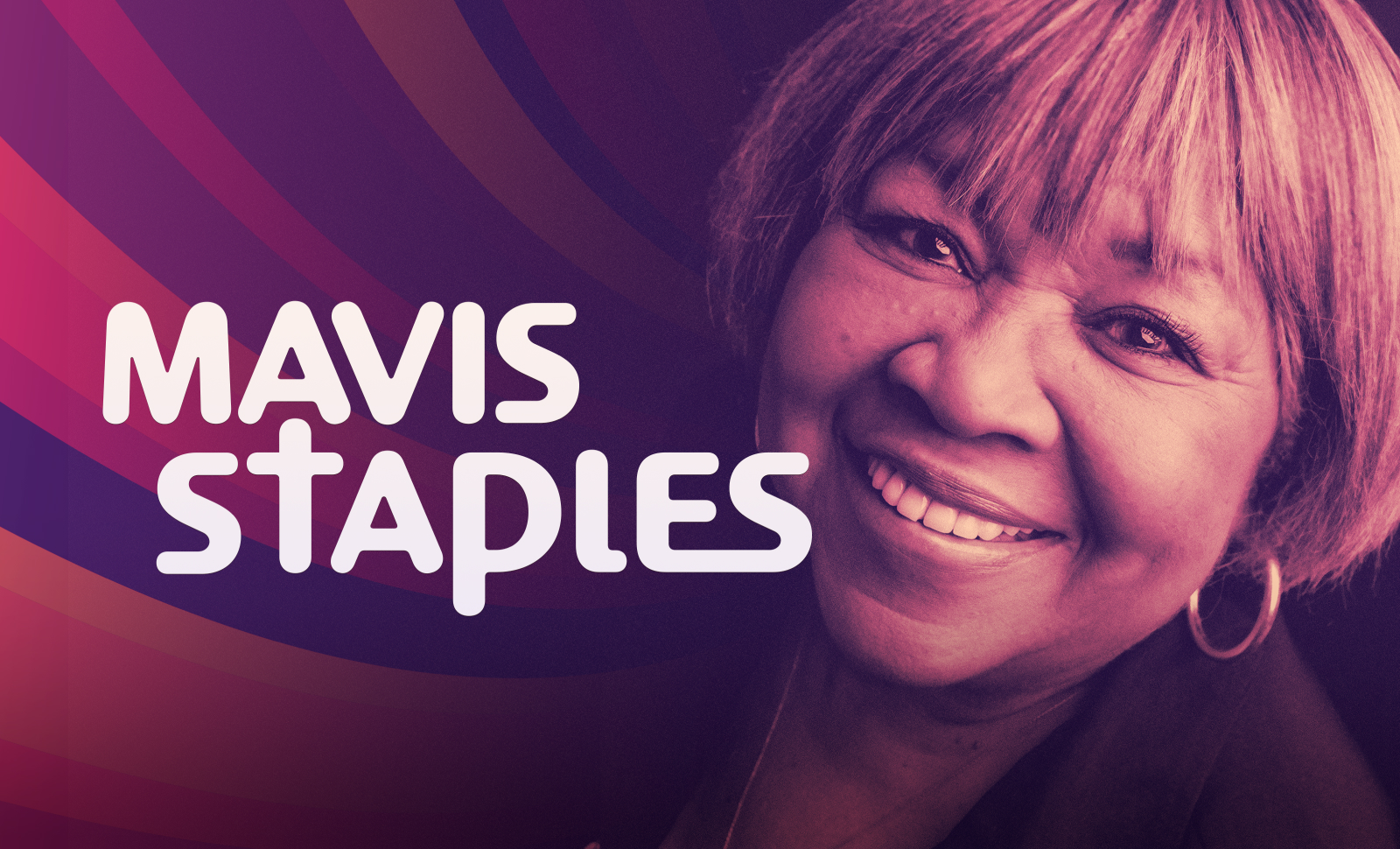
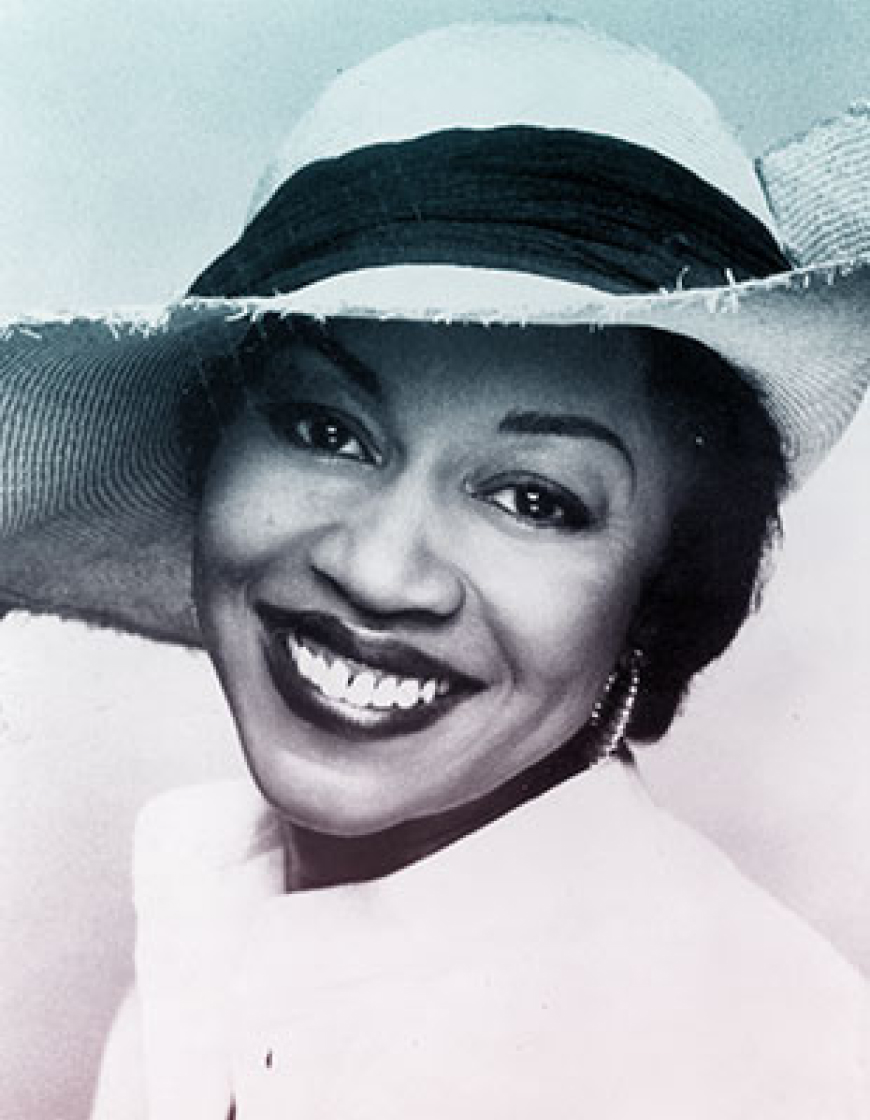
For over 70 years, Mavis Staples has been hailed as one of the most gifted and distinguished singers of all time, stirring audiences with her powerfully illustrious voice and mastery of various genres. In fact, her career can serve as a roadmap of popular music over the last century, leading from the churches of Chicago to the marches alongside Dr. King to her later collaborations with the likes of Arcade Fire and Prince. Yet despite her exhaustive contributions to music and her unparalleled creativite longevity, Staples’ most laudable characteristic may very well be her unwavering commitment to the causes of equity and justice, a lifelong battle that still guides the life and art of a true American icon.
Mavis Staples was born in Chicago on July 10, 1939 to parents Roebuck “Pops” & Oceola Staples, who had relocated to the Windy City from their native Mississippi a few years earlier. Pops, who had played alongside blues guitarists like Charlie Patton, Robert Johnson, and Son House back in Mississippi and sang with gospel groups around Chicago, began forming a family gospel group in the late 1940s. Despite being the youngest of four siblings, Mavis became the group’s lead singer at the age of 10 as they performed at churches in and around Chicago. In 1953, the Staple Singers debuted their self-released single “These Are They” / “Faith and Grace,” with Mavis and her father alternating lead vocals.
In 1953, the Staple Singers debuted their self-released single “These Are They” / “Faith and Grace,” with Mavis and her father alternating lead vocals. The group continued to record with an assortment of local labels until 1957, when they signed with the Vee-Jay label and scored their first major hit “Uncloudy Day.” Although her siblings were gifted singers in their own right, Mavis’ voice captured audiences and record executives alike, the latter of whom encouraged her to go solo with a focus on secular music.“ In our first years, I’d been offered millions to record secular music,” she told NPR. “People like Vee-Jay Records made offers, and other labels that were out during that time, but it just didn’t appeal to me. I’ve never felt that I’ve lost anything by not doing that. I’ve always felt that, you know, singing with the family and singing the gospel songs was the best for Mavis.”

While a solo career and a foray into secular music were both in her near future, Mavis’ decision to remain with the Staple Singers proved to be wise. By the mid-1960s, the group was one of the most popular gospel acts in the country, earning Grammy nominations, hit singles, and a legion of adoring fans, including two particularly notable admirers. The first was Bob Dylan, who later recalled hearing “Uncloudy Day” on the radio and cited the Staples Singers as an early influence on his style. He described Mavis Staples’ voice as a “fog rolling in … I knew who Mavis was without having to be told. Her singing just knocked me out.” Years later, the two would famously have a courtship that ultimately resulted in Dylan proposing marriage.
The second was Dr. Martin Luther King, Jr., who the group met while on tour. “I first met Dr. King at his church in Montgomery, Alabama…Someone let Dr. King know that we were in the audience. And he acknowledged us,” Mavis said. “He said: ‘we’re glad to see that Pops Staples and his daughters are here this morning’.” After a brief meeting with Dr. King, the family returned to their hotel rooms. Mavis recalls her father telling his kids that evening “listen y’all, I like this man. I really like this man. I like his message. And I think that if he can preach it, we can sing it.”
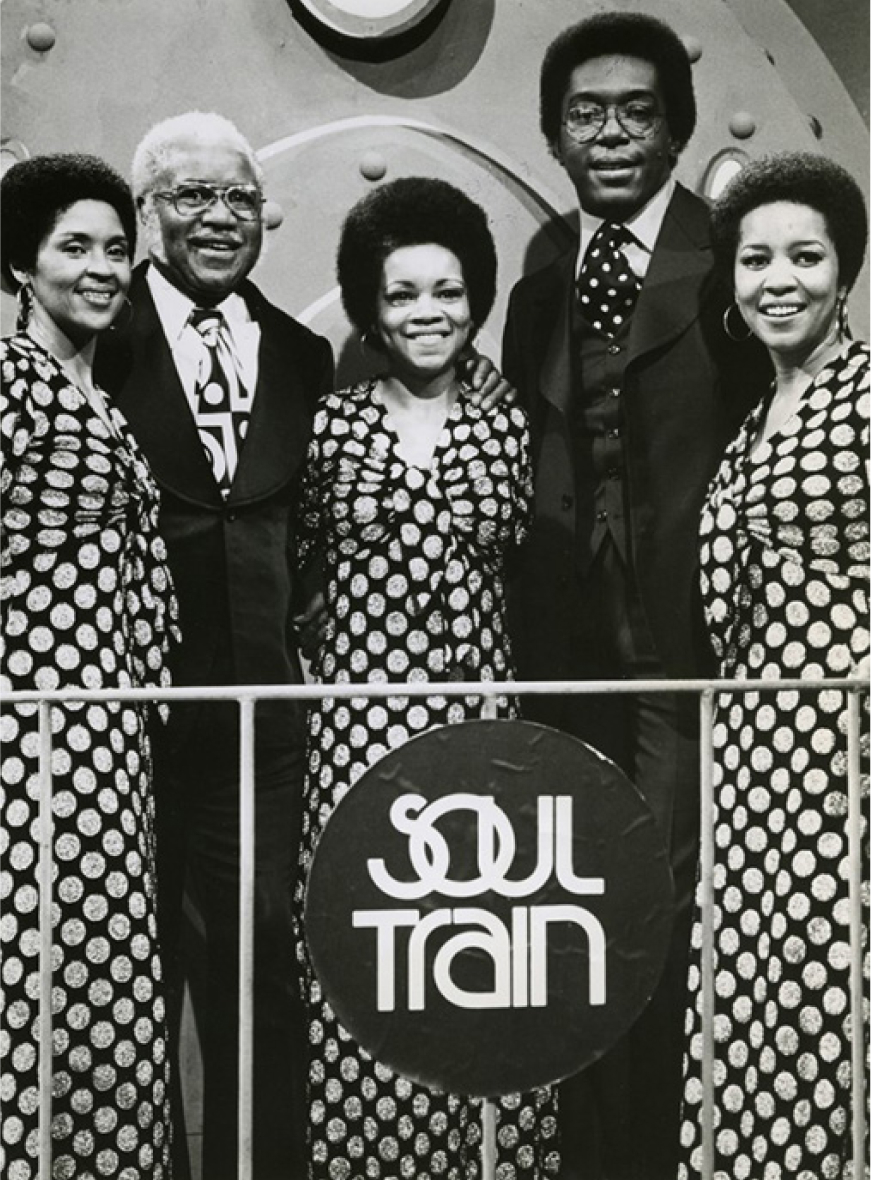
Inspired by Dr. King’s message and the revolutionary fervor gripping the nation, the Staple Singers entered a new creative peak during the 1960’s, blending gospel and soul into rousing anthems that spoke directly to the struggle of the civil rights movement. “We began writing freedom songs,” Mavis recalled. “‘Freedom Highway’ was the first. And, boy, when we got to a place where Dr. King was, we would sing before he would speak. At this time, Pops wrote ‘Why Am I Treated So Bad?’…and that turned out to be Dr. King’s favorite.” These “freedom songs” provided a soundtrack to the movement and further expanded their fanbase, giving them crossover appeal that few gospel groups ever achieved.
In 1968, the Staple Singers signed to Memphis’ Stax Records, one of the country’s most notable purveyors of soul music. With musical accompaniment from members of Booker T. and the MGs, the group’s sound evolved even further, shifting away from the folkiness of their earlier material into a more contemporary Southern soul sound.
In 1969, Mavis officially went solo, releasing a self-titled debut that journalist Ronn Wynn hailed as proof that Mavis “doesn’t have to play second fiddle to anyone, including Aretha Franklin, when it comes to pure, house-rocking, testifying authority.”
Between 1971 and 1975, the Staple Singers hit the Top 40 eight times, including two No. 1 singles, “I’ll Take You There” and “Let’s Do It Again.” While these were less overtly political than their predecessors, they still conveyed a sense of black pride and agency. Mavis explained this transition in an interview, saying “our first thing was protest songs. That was during the time we were with Dr. King during the movement. After, we felt that things had gotten a little better as far as the Black movement went. But after the protest song, we looked around to see gangs. So we came with ‘Respect Yourself.’ These are the message songs, ‘Respect Yourself,’ ‘I’ll Take You There,’ songs like this.” These songs also offered up notions of personal responsibility, dignity, and hope to a nation desperate for such sentiments.
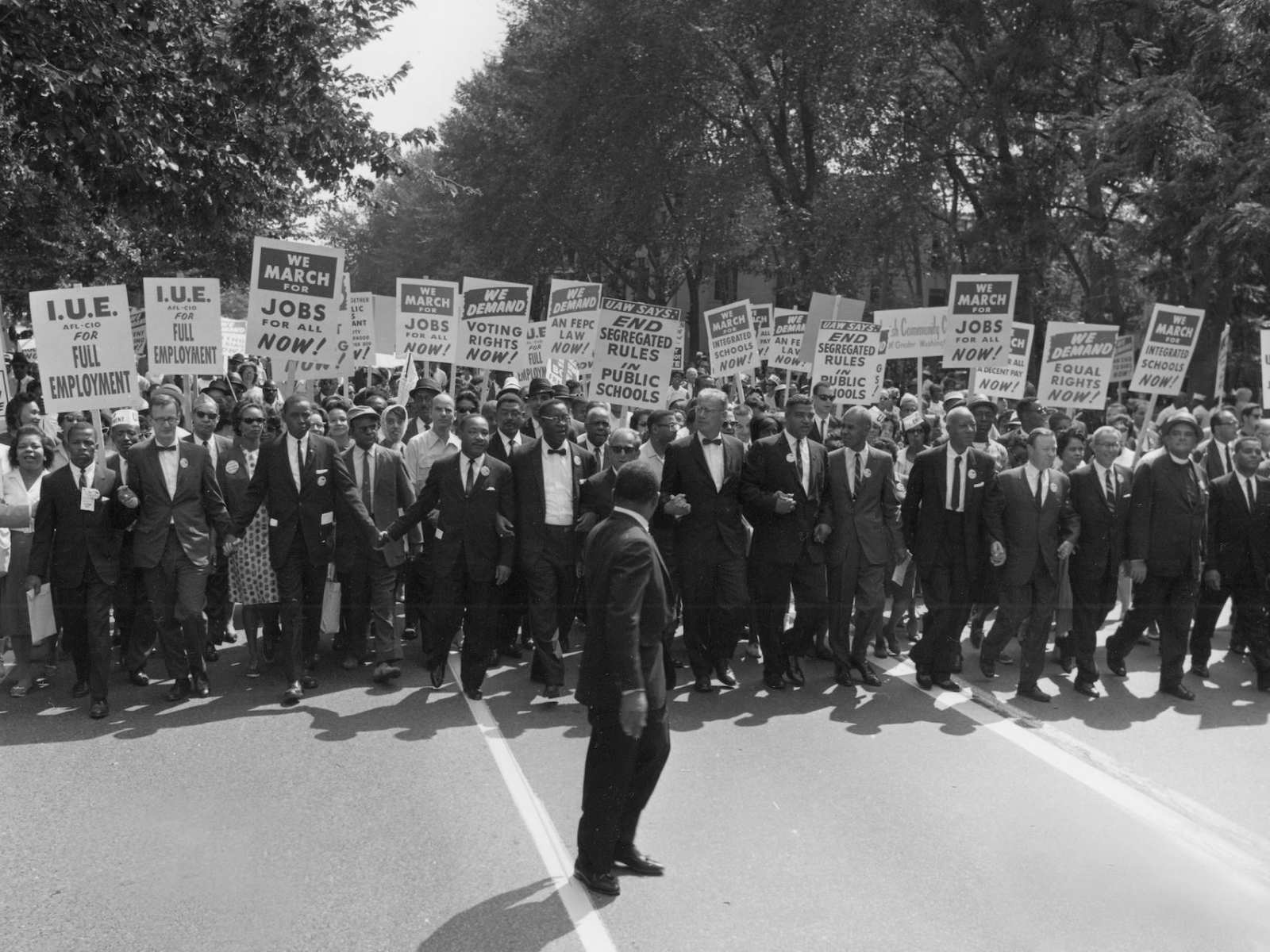
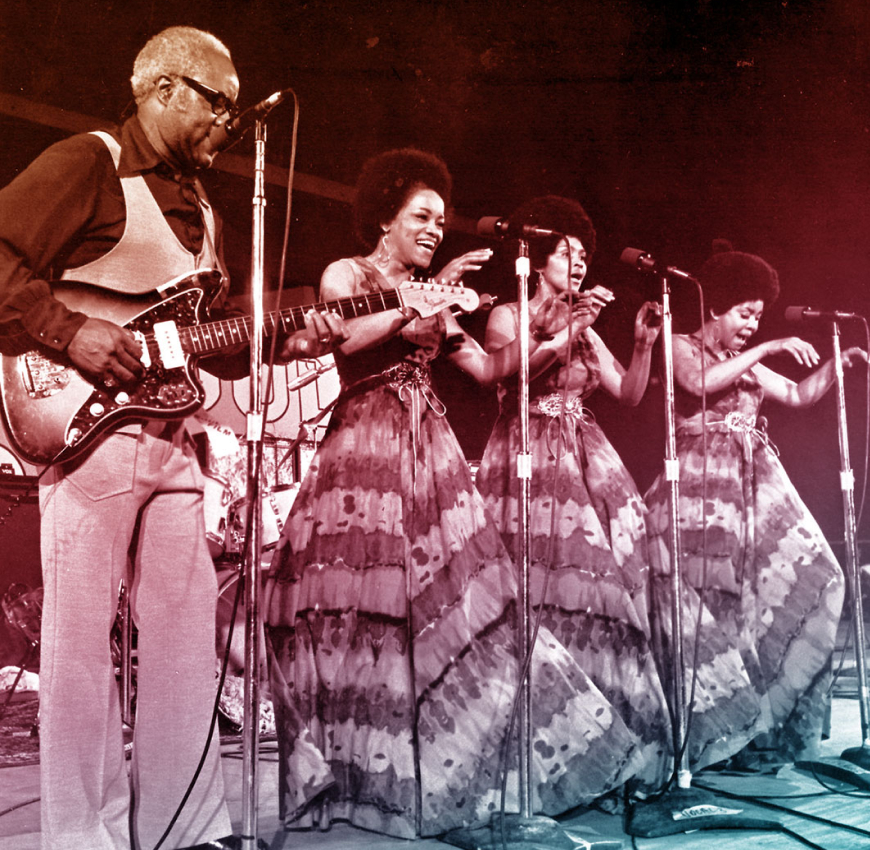
At the height of their creative and commercial powers, Mavis and the Staple Singers would perform at two of the most legendary concerts in history, both of which were captured on film: 1973’s Stax Records’ showcase “Wattstax” and the Band’s final performance in 1976 dubbed “The Last Waltz.” Despite the odds, an unassuming family gospel group from Chicago had taken the world by storm and emerged as one of the decade’s most influential acts. At the center of their success, of course, was Mavis’s golden voice.
While Mavis had previously gone solo on albums such as 1970’s Only for the Lonely and 1977’s A Piece of the Action, her career up to this point was still inextricably tied to the Staple Singers. By the 1980s, however, Mavis officially departed her family’s group in order to focus on her career as an independent artist. In 1983, Mavis released a charting single called “Love Gone Bad” and in 1987 she duetted with Aretha Franklin on “Oh Happy Day,” which would go on to be nominated for a Grammy. Two years later, Mavis teamed up with Prince and his Paisley Park label for 1989’s Time Waits for No One and 1993’s The Voice. As always, her assertive, blistering vocals shone through, even if the public was largely indifferent. On both Prince-produced projects, Mavis continued to speak eloquently about the issues of the time on fiery message songs such as “20th Century Express” and “The Undertaker.” Following a relatively quiet period, the dawn of the new century would bring about a series of immense peaks and valleys for Mavis, beginning with the Staple Singers’ induction into the Rock & Roll Hall of Fame in 1999. Sadly, just a year later, the family’s patriarch Pops Staples passed away and Mavis found it difficult to perform without him. “I was having a hard time,” she said. “I didn’t hear Daddy’s guitar.” Eventually, Mavis was convinced to return to the stage by her sister Yvonne, which would lead to her most fruitful and creative period in decades. In the early 2000s, Mavis duetted with former beau Bob Dylan on an incandescent version of “Gonna Change My Way of Thinking” that was nominated for a Grammy. The following year, she teamed up with Dr. John on “Lay My Burden Down,” which was also Grammy-nominated.
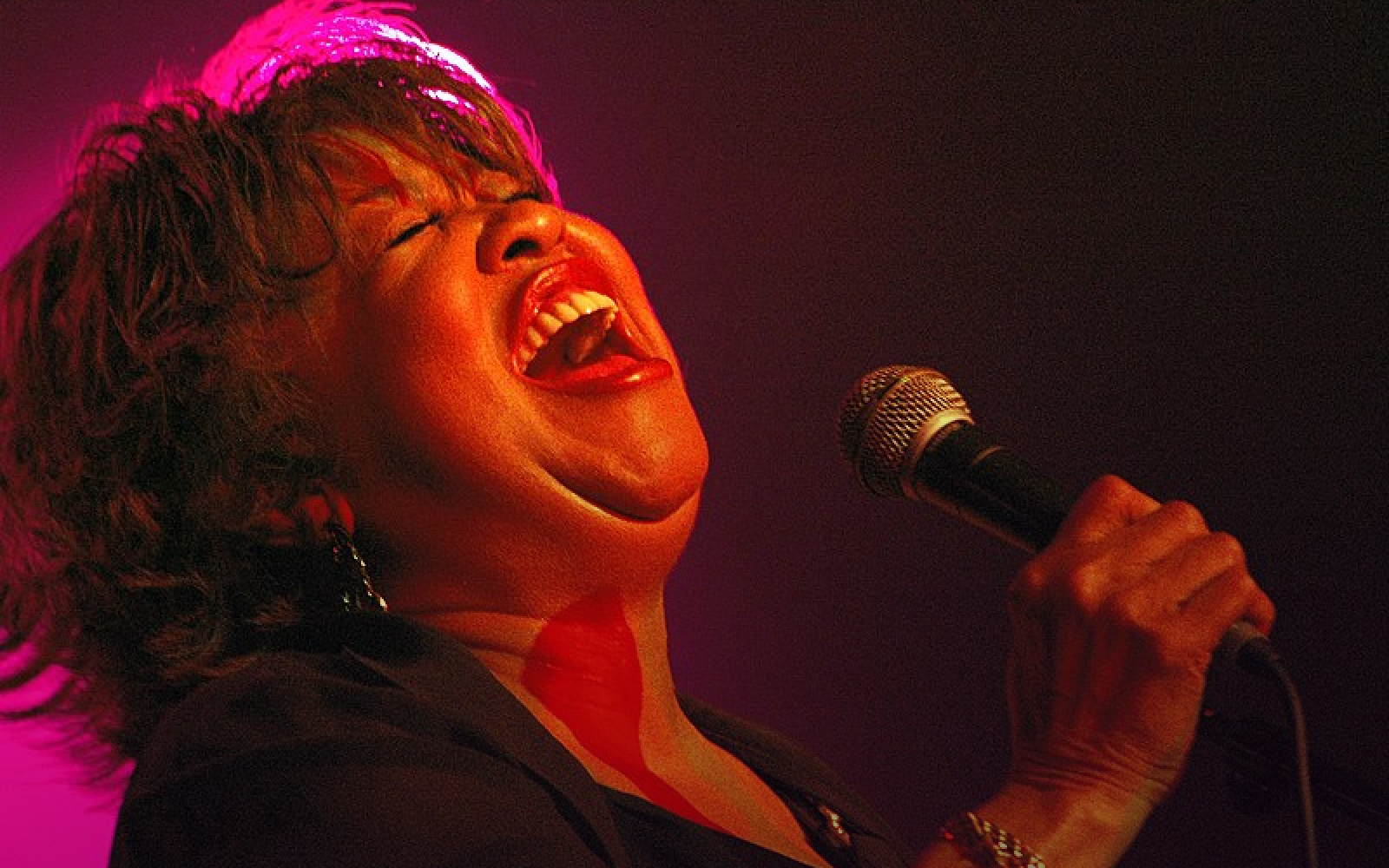

Within the last decade, Mavis’ profile as a singular talent and a bridge to soul music’s history has continued to rise to newfound heights. Not only was her previous music being given new life through sampling by artists such as Ice Cube, Ludacris, and John Legend, she’s become the de facto choice for younger artists looking to collaborate with one of their idols. From hip-hop duo Run the Jewels to jazz musician Jon Batiste, seemingly everyone has tried to secure a coveted feature from the legendary singer. Her intolerance for segregation seems to apply to the musical realm as well.

In 2021, Mavis garnered further attention for her show-stopping performance alongside her idol Mahalia Jackson in the Oscar-winning documentary Summer of Soul, which documents the 1969 Harlem Cultural Festival. In a film that features riveting performances from all-time greats such as Stevie Wonder and Sly and the Family Stone, Mavis’ toe-to-toe performance alongside Jackson is arguably the most riveting scene in the film, a real-time passing of the torch from one gospel genius to the next.
In her eighties, Mavis Staples continues to stake her claim as one of the world’s all-time great vocalists, doing so with a spirit of adventure and a sense of optimism that is truly inspiring. At the heart of this perseverance is an unwavering faith in God, which, alongside her commitment to justice, has driven her unparalleled career. “That’s why I’m still here. He lets me know when I’m right and when I’m wrong, but he ain’t letting me know about when my time is coming. I’ve kept my father’s legacy alive. Pops started this, and I’m not just going to squander it. I’m going to sing every time I get on the stage – I’m gonna sing with all my heart and all I can put out.”

Be the first to add your voice.